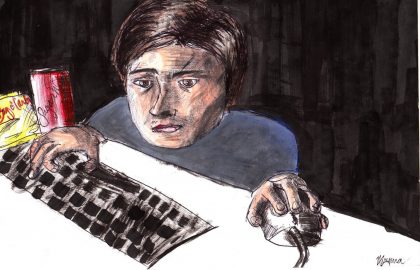Decoding City College’s hackers
Above photo by Cassandra Greenwood/Special to The Guardsman
By Adina Pernell
Computer hacker—just stating those words often conjures up images of a disillusioned 20-something, with a hefty chip on his shoulder and eyes marbled red from one too many espresso shots.
During my first visit to the CCSF Hackers Club, I took on a more open approach to allow real hackers and hackers in training to give me the scoop, free from Hollywood tall tales and sensationalism.
The club holds weekly meetings on Mondays at 5 p.m in the Ocean Campus’ Science Building. I was as nervous and intrigued to meet them as when I was an adolescent who played the computer game “Quake,” which had the message “Satan has invaded your hard drive” for an exit screen.

The first club member, who identified himself as Dillon Smith, typed intently on his laptop and greeted me with a smile. Sitting next to Smith’s immediate right was club president Duff, who refused to divulge his last name.
Duff jokingly described himself as “just a figurehead” who gained the title of president because he was “the loudest.”
Everyone but Smith was unwilling to relinquish a last name. I feigned irritation, but was secretly thrilled that some of the mystique of hacker counterculture held true.
I sat next to a friendly young woman named Rachel, and my curiosity got the better of me. I wanted to know how the club felt about the media’s portrayal of hackers in movies and shows like “Mr. Robot.”
In response, Rachel opened the laptop she was holding and started vigorously typing gibberish.
“I’m just gonna start mashing keys,” she said, laughing. Everyone else mimicked her behavior to show the absurdity of how hackers are portrayed.
Duff conceded that a lot of representations of hacker things in the media are “cringey.” He has a much more practical perspective.
“When people think what you do is magic, in reality it’s a lot of training,” Duff said.
Rachel, on the other hand, wanted to bust antisocial stereotypes on hackers and insisted that a lot of hackers are sociable. She would rather have them be seen as three-dimensional people with other interests in addition to computers.
Duff and the club’s co-founder and treasurer Tom changed the subject to the club’s participation in an upcoming hacking competition called the Collegiate Pentesting Competition (CPTC).
Pen testing involves testing various computer systems or applications for vulnerability. The CPTC sets hacking teams from different universities against each other to test skills and win cash prizes.
“We’re very big on competitions,” said Duff. “Even though we’re joking around, we try hooking people up with jobs in the security field and just have fun exploring hacking.”
These two goals are, according to Duff, the main purpose of the CCSF Hackers Club.
With all this talk about computer systems and vulnerabilities, I asked the club how they felt about the April 2016 phishing incident, in which 7,500 student social security numbers were compromised.
Duff’s advice: “People can look and sound official, but you have to be wary when it comes to giving out sensitive information. Ask questions, and don’t just take the fact that they sound authoritative for granted.”
That being said, he felt that City College fell short by offering only a year of identity protection.
“After a year, all those social security numbers are no longer protected,” Duff said.
In addition, he felt the college should “teach people how to monitor their identities and teach workshops so you know what to do if your identity is stolen.”
Interjecting, Tom said “it’s only a question of how easy or how difficult it is to get what they want.”
I then asked how they felt the general public viewed hackers.
“Hackers used to mean you are good at computers. Now it’s taken on a negative connotation—hacker is being co-opted as a media scare term.
“The general public doesn’t really know white, gray, black hackers,” Smith continued. ‘White hat’ hackers are good guys, ‘black hat’ is more nefarious and ‘gray hat’ is the chaotic neutral.”
Smith further expressed that the law doesn’t always discriminate: “Even if you are a good guy, you are doing something illegal now.”
Duff agreed with Smith.
“The way the law stands now, if you see a system without permission, you are technically breaking the Computer Fraud and Abuse Act,” Duff said.
As the club wrapped up their meeting, I was invited to join the following week for a club pizza party.
Duff said that the CCSF Hackers Club works closely with The Coder’s club, another tech club on campus. Both are open to anyone who wants to learn about ethical hacking—even non-techies like me.

Pingback: Decoding City College's #hackers | Secure Cyber Solution